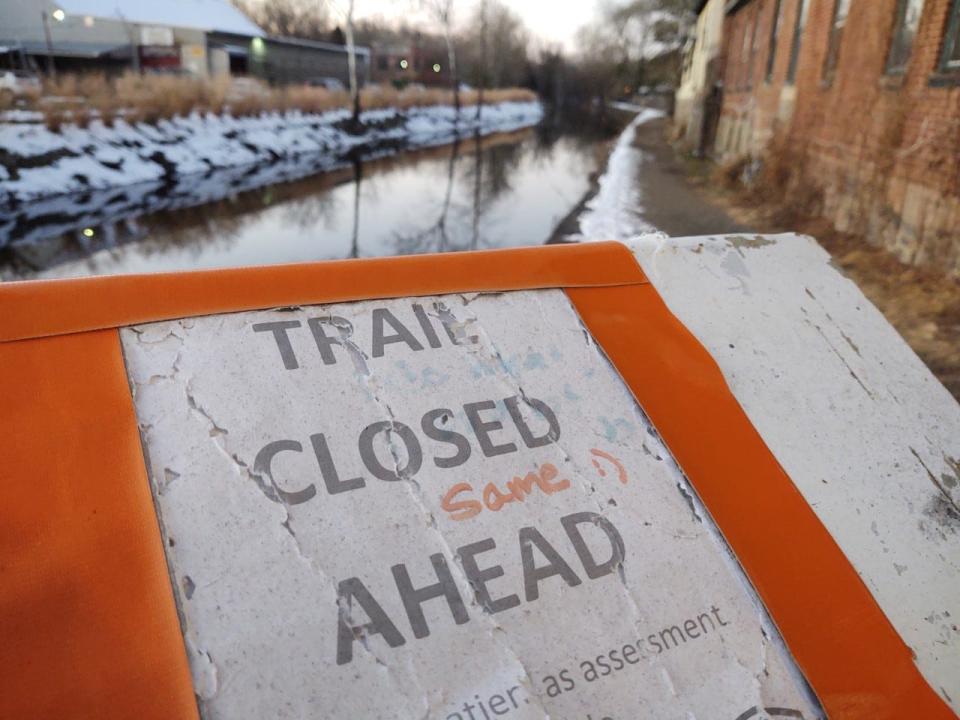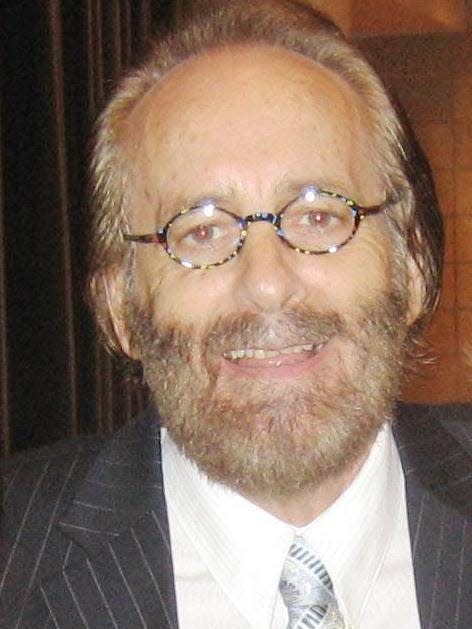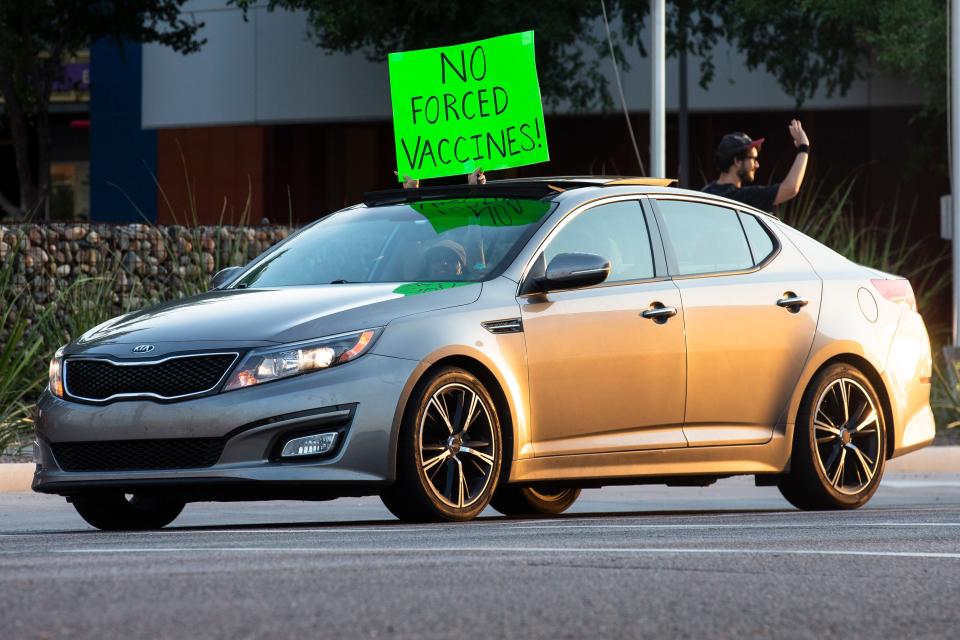The COVID hoax? The climate hoax? Why we double down on bad ideas
Insight — when it comes suddenly — is like a breath of mental fresh air.
Mine came outdoors, during a pleasant walk along the D&R Canal in Lambertville, a few months back. Pleasant, that is, until I came to a sign.
"Trail Closed Ahead."
Says who? And why? Some overcautious bureaucrat, no doubt, worried that I might stub my toe on a root and sue. There couldn't be any real danger, right? And anyway, shouldn't I be able to decide for myself?
I felt irritation. Then self-righteousness. To hell with the sign. Why shouldn't I go on? I did.

Then a picture flashed in my head.
I was struggling in the icy water. A helicopter was lowering a safety line. As I flailed beside the rotten bridge that had given way — or the mud slick I'd slipped on, or whatever else it was — I heard the guy say, "What's the matter with you, buddy? Didn't you read the sign?"
I turned back.
It was sheer stubbornness that made me go on in the first place. And it was only fear of embarrassment that made me change my mind.
My behavior, in other words, was not so different from many COVID patients now in hospitals — the ones who said to hell with getting vaccinated, to hell with the mask, the ones whose obstinacy is now putting doctors and nurses at risk.
Just say no
Could it be as simple as stubbornness? Is that what's causing so much of America's chaos right now?
The person, for example, who refuses to take a CDC-vetted vaccine — but will eagerly swallow hydroxychloroquine, Ivermectin or Aunt Sally's Nettle Tonic?
Or the one who insists that climate change is a hoax? Or that the 2020 election was "stolen"? And who doubles down, when presented with authoritative evidence to the contrary?
We're all like that, sometimes.
More: Eric Boehlert helped us become more media literate. Here's how we continue his work
"We have this very deep strain of resistance to authority, challenging the norms," said Frank Farley, former president of the American Psychological Association.

The usual explanation for our divided culture is all the bad information out there. Part of the problem, for sure.
"If people are not reading mainstream, well-checked media, they haven't gotten the memo, in a very real sense," said Julia Minson, an associate professor of public policy at the Harvard Kennedy School of Government.
But which came first — the bad information, or the impulse to look for it? You have to be highly motivated to deliberately ignore the recommendations of the Centers for Disease Control and Prevention and instead dig up details about a horse worm medication available only at a farmers' supply store.
"Commitment and consistency" is a clinical term. First we have the viewpoint. Then we choose the facts to fit it.
"People commit to a view, and then think and act in a way that is consistent with that view," said Robb Willer, a professor of sociology at Stanford.
More: What is reality? In a divided America, maybe philosophers can tell us
Resist
Cussedness, it's long been noted, is one of the classic American traits. It's hard-wired into us.
"How can you tell an American?" asked Maxwell Anderson in a lyric to the 1938 Broadway show "Knickerbocker Holiday." The answer: obstinacy.
"It isn't that he's Black or white, it isn't that he works with tools," sing the characters. "It's only that it takes away his appetite to live by a book of rules."
Americans are born stubborn. Or, if not, we pick it up at an early age.
"Why did the children put beans in their ears," Carl Sandburg asked in a poem, "when the one thing we told the children they must not do is put beans in their ears?"
And stubbornness, obviously, can be a good trait. Authority should be bucked, sometimes. Convictions should be stuck to, sometimes. What we consider those times is one of the things that make some of us veer right and others veer left.
More: Censorship may be evolving, but is not new in the United States

But what if it's a case of a pandemic that has killed 900,000 Americans (so far)? What if it's climate change, which is already affecting the world in ways that are all too evident, from superstorms in New Jersey to melting ice caps in the pole?
What if it's an election that no number of recounts will convince you wasn't stolen? What if it's stuff that shouldn't be ideological, but simply logical?
'Toxic individualism'?
"Toxic masculinity" is a term we're hearing from some quarters these days. Perhaps it's time we also consider toxic individualism.
Both are examples — bottom line — of Too Much of a Good Thing.
"When you take them to an extreme, you have this potential negative consequence," Minson said,

Minson is a decision scientist. Her field is studying how people make the choices they make — especially people in a conflict, or people who disagree strongly with one another. And right now, something appears to have gone off-kilter in our decision-making.
"People are not changing their minds, as a result of the evidence, as dramatically or as quickly as they should," she said.
It's been noted — and we've all seen — that people challenged on their particular sticking point tend to become more, and not less, obstinate.
"Belief perseverance" was first studied in the 1950s, in connection with a doomsday cult that refused to admit the world was not ending on Dec. 21, 1954. Even after Dec. 21,1954.
The tendency to dig in our heels, when confronted by contrary facts, also has a name: the "backfire" effect. Also known as the "boomerang" effect. But being twice as committed to a bad idea doesn't make it twice as correct.
"People who have taken a position on something and acting consistent with it in the past show a tendency to continue in the same lane going forward," Willer said. "They tend to evaluate new evidence in the light of previous beliefs — which makes it hard to change people's minds."
Keeping control
The question is: Why do we cling to bad ideas in the first place? Especially when we've been informed, by competent authority, in reasonable terms, with copious evidence, what the facts are?
There could be several mechanisms at work.
One is the automatic reaction many of us have when we feel that control is being taken away. "Psychological reactance" is the clinical term, coined by Daryl Bem, a social psychologist from Cornell.
"In other words, 'Don't tell me what to do, even if it's good for me,' " Minson said. "As you can imagine, not everybody is equally prone to that. Some of it is personality. Some of it is cultural."
It's the impulse that makes us want to walk on the grass when the sign says "Don't Walk on the Grass." Or go to a superspreader event, with our masks off, when the governor says the one thing you must not do is go to a superspreader event with your mask off.
Freedom and liberty are in the American DNA. When people tell us what to do, we resent it.
Even when it happens to be the right thing to do.
"We are a nation of individualists," Farley said. "We don't like being pushed around."
Seeing is believing
Then, too, we are often victims not so much of bad information, but of limited information. In America, it's not just Missourians who are from Missouri. At one time or another, we all say: "Show me."
"People are much more comfortable following the evidence they can see to the evidence someone tells them about," Minson said.
A hiker confronted with a sign that says "Trail Closed" — to choose a random example — might not take the message seriously if there is no visual evidence and no convincing explanation.
Likewise, someone from Michigan, who has not lived through a 1 million acre California wildfire or a mega-hurricane in Louisiana, might believe that climate change is a tempest in a teacup. In their experience, it is. So might COVID be, to someone from a rural area who has not seen a city shut down by it.
"One of the things that have played a big role in COVID denial is the fact that our country is huge, and so people who live in sparsely populated areas never, for a long time, saw anybody with COVID," Minson said. "They heard about this thing, but they never actually experienced it directly. We blame their ideology. But their lived experience is different from the people in New York."
Second thoughts
So how do you change people's minds? The good news: It can be done. The bad news: It can take a while.
"Imagine there's a hundred people who believe aliens just landed on the White House lawn," Minson said. "You show them security footage of the White House lawn. Here's the lawn. No aliens. What you'd expect is that 100 out of 100 say I'm wrong, no aliens. What we see is that 20 acknowledge that OK, there's no aliens — and 80 believe there are still aliens, and make up some story about why you redacted the part about the aliens."
In other words, "belief perseverance" — all the more potent when there is a sizable group of people who share your belief.
"Men, it has been well said, think in herds," said Charles Mackay, author of the prescient 1841 book "Extraordinary Popular Delusions and the Madness of Crowds."
"It will be seen that they go mad in herds, while they only recover their senses slowly, and one by one," Mackay said.
But most do recover their senses. Eventually. People are changing their minds right now about COVID vaccines, as GAVI, a global vaccine alliance, noted in an Oct. 1, 2021, article.
Though maybe not fast enough.
"What happens is that people are being persuaded by the evidence, but very, very slowly," Minson said.

The lesson here: Be patient when trying to cast the mote out of your neighbor's eye.
As you hope he will be, when he casts the beam out of yours.
"I do think we're shooting ourselves in the foot by pointing fingers so much," Minson said. "Nobody has ever been persuaded of anything by calling them crazy."
Jim Beckerman is an entertainment and culture reporter for NorthJersey.com. For unlimited access to his insightful reports about how you spend your leisure time, please subscribe or activate your digital account today.
Email: beckerman@northjersey.com
Twitter: @jimbeckerman1
This article originally appeared on NorthJersey.com: COVID hoax? Climate hoax? Why we double down on bad ideas

